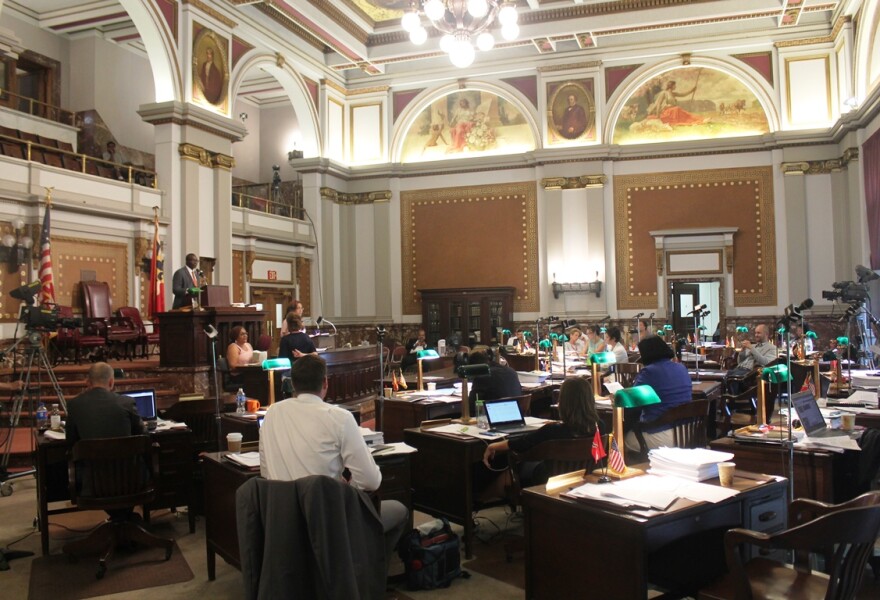Updated 4:57 p.m. May 29 with comment from Pam Boyd, D-27th ward — A plan to implement the voter mandate to reduce the number of wards in St. Louis is underway. Exactly how it will be done, though, is still up in the air.
Alderwoman Heather Navarro, D-28th ward, chairs a yet-to-be-formed advisory committee that will design a transition plan to go from 28 wards to 14 by 2023. While the redrawing of ward lines will be left up to the Board of Aldermen, Navarro’s advisory committee aims to study how the smaller group of aldermen would equitably deliver city services, among other things.
That committee was meant to deliver a report on ward reduction by the end of May. The committee, however, has not yet been assembled. Navarro says that’s because she wanted the process to be as inclusive and transparent as possible.
“If I was the only one pulling together the selection committee or pulling together the advisory committee members, there would be no credibility behind the recommendations that came out of that committee,” she said. “You know, I’m only one alderperson, and I’m a white woman from the central corridor.”
Alderwoman Pam Boyd, D-27th ward, stepped down as the co-chair of the committee a few weeks ago. Boyd said she did so because she didn’t feel she could continue to give as much of her time to the committee as things became busier in her ward. She said she’s been against ward reduction from the beginning, but she agreed to co-chair the advisory committee so she could weigh in on a transition plan if the measure went through.
“Heather and I agree we need to be thinking in case it went through and passed anyway. How would it look, how would the aldermen get paid, how many secretaries would they have, how would services be done?” she said. “We were clear we had to be proactive, to be ahead of it.”
Last year, the two co-chairs chose a five-person selection committee that will decide who will be on the forthcoming advisory committee. So far, that selection committee has received more than 50 applications for what will be an 11-member advisory committee.
That will include three city residents, two at large members, a representative from a nonprofit that works with neighborhood groups, a representative from the mayor’s office, a representative from city counselor’s office, an academic advisor and the aldermanic co-chairs.
Last week, Navarro shared those updates with the Board of Aldermen’s Legislation Committee. There, a vocal opponent of ward reduction, John Collins-Muhammad, D-21st ward, questioned the inclusiveness of the process. He argued there hasn’t been enough input from African American residents on the city’s north side, and that there’s not enough time to reduce wards in a way that would be equitable to those specific communities.
During a public comment portion of the meeting, several city residents echoed Collins-Muhammad’s concerns.
Lucinda Frazier, committeewoman of the third ward and vice chair of the Democratic Central Committee, said she’s concerned ward reduction would mean it will be harder to get simple things done in the community — like making sure the grass is cut.
“We have services that we have to constantly call in the alderman of the third ward and myself … to do this and do that,” she said. “So imagine if they reduced it to 14. Imagine how hard it’s going to be for us to get any services, not just in north St. Louis, but in south St. Louis, too.”
Navarro says whether or not ward reduction should happen is a separate issue from what her committee is tasked with doing.
“If people want to keep debating ward reduction, that’s fine. At the same time, it is currently the law on the books, and if we are not prepared for it, it will be a disaster,” she said.
Collins-Muhammad agrees it will be “horrific” if there is no transition plan.
“Realistically, I don’t see a plan being set in place,” he added.
Earlier this month, he introduced a bill that would allow the public to vote on the matter again next year and said he has the votes.
Boyd said she’s co-sponsoring Collins-Muhammad’s bill because she’s concerned that fewer wards will make it even harder for residents to gain access to city services. That’s already the number one thing she hears from her constituents.
“The reason why I’m supporting it is I feel very strongly that a lot of residents weren’t educated on the impact of ward reduction. And so I think they need to be educated more so they would understand what the impact is and that’s what I’ve been trying to do,” she said.
Collins-Muhammad sponsored a similar bill last session, but eventually withdrew it in December after the bill had stalled for months.
At the time, Mayor Lyda Krewson said she intended to veto the a bill. In a tweet last year, she said “I was a primary sponsor of (ward reduction) then (in 2012)… and I have not changed my mind.”
Navarro said she’s hopeful the selection committee will decide on the advisory committee members by mid-June. Yet after missing the May deadline, she’s uncertain whether the delay will mean she must reintroduce the resolution to the Board of Aldermen in order for the committee to convene.
Correction: Pam Boyd, D-27th ward, stepped down as co-chair of the advisory committee a few weeks ago. An earlier version of this article misstated when she resigned from her position.
Follow Corinne on Twitter: @corinnesusan
Send questions and comments about this story to feedback@stlpublicradio.org




